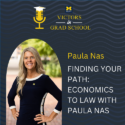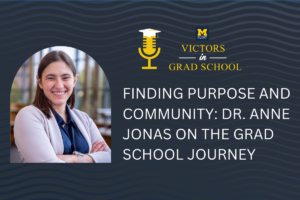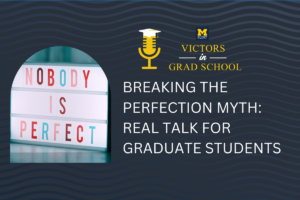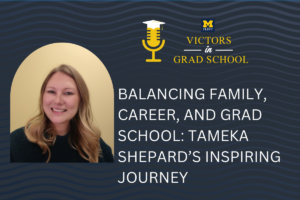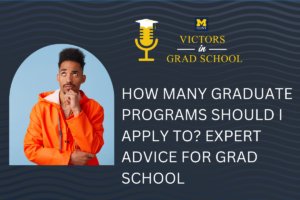
Graduate school is often viewed as a labyrinth that requires significant introspection and preparation. On the latest episode of the *Victors in Grad School* podcast, host Dr. Christopher Lewis explores this intricate path with Paula Nas, an accomplished academic and professional at the University of Michigan Flint. Paula’s unique journey through both a Master’s degree in Economics and a Law degree provides invaluable insights for anyone considering or currently navigating graduate education.
Embracing Challenges and Making Decisions
Paula’s academic journey started at the University of Michigan Flint, where she completed her bachelor’s degree in Economics. Initially torn between law and teaching, she discovered that Economics not only piqued her interest but also provided a solid foundation for law school. This excitement led her to pursue a PhD in Economics at Michigan State University, a decision influenced by the enticing offer of an assistantship.
However, the PhD program’s heavy emphasis on research over teaching compelled her to pivot back to her initial goal of law school. She ultimately attended Wayne State University, a choice driven by reputation and practical considerations like commuting.
Key Takeaways:
- Being open to new and challenging fields can lead to unexpected passion and opportunities.
- Career goals might evolve, and flexibility is essential in navigating these changes.
- Practical considerations like location and support systems can significantly influence educational decisions.
Preparation and Skill Building for Graduate School
Transitioning between different graduate programs required Paula to develop effective strategies for success. The similarity between undergraduate and PhD programs made the initial shift smoother as compared to adjusting to law school, which demanded a different approach due to its larger class sizes and different educational structure.
Finding a supportive group of peers was crucial for her success in both settings. The support, encouragement, and collaborative study habits formed within these groups made significant contributions to her academic achievements.
Paula emphasizes the following:
- Patience: Adjusting to the demands of graduate school requires time.
- Support System: Whether through family, friends, or classmates, having a reliable network is indispensable.
- Practical Application: Engaging with the material beyond textbooks through community involvement and real-world applications enhances understanding and retention.
Versatility of Graduate Degrees
Paula’s career showcases the versatility of a graduate education. Her diverse academic background in economics and law equipped her with a wide array of skills applicable in various professional roles. As a lecturer and now in her role at the Office of Economic Development, these degrees have been fundamental.
Applications of Graduate Degrees:
- Critical Thinking: Both fields foster analytical skills and problem-solving abilities.
- Teaching and Public Service: The broad educational experience has been pivotal in her municipal service and public policy decisions.
- Economic Development: Using economic principles and legal frameworks to facilitate community and business growth.
Drawing from her extensive experience, Paula offers several tips for those considering or currently in graduate school:
- Patience is Key: Allow time for adjustment and avoid getting disheartened by initial challenges.
- Build a Support Network: The journey is more manageable and enjoyable with reliable support from peers, family, and mentors.
- Look at the Big Picture: Focus not just on immediate academic requirements but on how the acquired skills will benefit future career aspirations.
- Enjoy the Journey: Despite the pressures, savor the learning experience and personal growth that comes with graduate education.
Paula Nas’s journey underscores the importance of adaptability, continual learning, and the practical application of diverse skills. Her story is a beacon for current and prospective graduate students, illustrating that success is not only about the destination but also about appreciating and utilizing the experiences gained along the way.
For individuals thinking about furthering their education, the University of Michigan Flint offers comprehensive programs tailored to meet both online and in-person learning preferences. For more information, prospective students can visit: UM-Flint Graduate Programs.
TRANSCRIPT
Dr. Christopher Lewis [00:00:01]:
Welcome to the victors in grad school, where we have conversations with students, alumni, and experts about what it takes to find success in graduate school.
Dr. Christopher Lewis [00:00:11]:
Welcome back to the Victors in Grad School podcast. I’m your host, doctor Christopher Lewis, Director of Graduate Programs at the University of Michigan, Flint. Really excited to have you back again this week. As always, every week, you and I are on a journey together. We have this opportunity every week to talk through this journey that you’re either already on or that you’re looking at and trying to decide for yourself, is this the right step for me? And the conversations that we have every week are an opportunity for you to add tools to your own toolbox to help you on this journey. This podcast is all about helping you find success in the journey. And I say journey because it is a journey. It is not something that’s going to happen immediately.
Dr. Christopher Lewis [00:00:56]:
Usually, you’re going to take some time to mull this over, to figure this out, to try to figure out what is the right direction for myself, what is the right institution for myself. And as you go through that process, that journey, you’re going to learn a lot about yourself, but you’re also going to learn a lot about what you’re looking for. And this podcast is here to help you as a resource along that path. Every week, I love being able to bring on different guests, different people that have had different experiences that can share those experiences with you to help you to again add tools to your toolbox. So this week we got another great guest with us today. Paula Nas is with us today, And Paula is the director of the office of University Outreach for the University of Michigan Flint. And she’s been at the University of Michigan Flint for quite a few years doing a number of different things along the years. But along that journey, she has gotten a number of different degrees.
Dr. Christopher Lewis [00:01:56]:
She got her bachelor’s degree at the University of Michigan, Flint, then went on and got a master’s degree in economics from Michigan State University and then a law degree from Wayne State University. So we’re going to talk about her own journey and be able to learn from her. Paula, thanks so much for being here today.
Paula Nas [00:02:12]:
Thanks so much for the invitation, Chris. I appreciate it.
Dr. Christopher Lewis [00:02:15]:
It is my pleasure. I love being able to have you here today and for you to share this journey. As I said, you went on a journey yourself. You went from that bachelor’s degree in economics from the University of Michigan Flint, and at some point, at some point in that journey when you were getting that degree from the University of Michigan Flint, you made a decision whether it was right at the same time or a little bit after, that you wanted to continue, wanted to continue on to get the master’s degree in economics. Let’s first talk about that jump and what made you decide that you wanted to continue on to get that master’s degree?
Paula Nas [00:02:52]:
That’s a great question. You know, I was in the honors program at U of M Flint studying economics. Initially, though, when I entered U of M Flint as an undergraduate, I wasn’t really sure what I wanted to do. Growing up, I always thought I’d either wanna be a lawyer or I’d wanna be a teacher. Early on, as I was kind of pursuing that path towards a law degree, somebody had mentioned to me that, you know, economics is one of the best majors that you can have to get into law school. So I said, well, I hadn’t really heard much about economics. You know, growing up, it never really was a word or a class we used at the time. But I said, if that’s my way to get to law school, that’s what I’m going to do.
Paula Nas [00:03:27]:
So I enrolled in an economics class and I found it to be one of the most challenging classes I had, but also one of the most fascinating. As I continued along the degree program, I grew more and more to like economics and appreciate the different facets of the profession. So, when it came time to graduate, I said to myself, I can either go to law school or I can pursue a PhD in economics. So, I took the GRE and I took the LSAT, and I performed pretty well in both of them, to be honest with you. And I applied to law schools and graduate schools, and Michigan State offered me a deal I really couldn’t pass up to enter their PhD program in economics. That’s what I did. I had an assistantship that paid for the program. So again, I started in the PhD program.
Dr. Christopher Lewis [00:04:11]:
So at one point you started the PhD program, but you ended up with a master’s. So along the way, you made a decision that you didn’t want to continue to complete the PhD and you pivoted. And you went back to that initial goal, that initial idea that you wanted to get that law degree. What made you decide to pivot, not get the PhD? And what made you decide that you wanted to move back to that initial goal, like you said, of getting that law degree?
Paula Nas [00:04:42]:
I love the program at Michigan State. Really, I was there because I wanted to teach phonemix. And what I quickly realized was that this was more of a research pursuit than a teaching pursuit. And the whole kind of publish or perish, you know, fear got to me. And I said to myself, I really want to teach, but this isn’t really what this is about. So I think I’m gonna go back and reconsider law school, at which point I applied to law school and then I entered Wayne State Law School.
Dr. Christopher Lewis [00:05:07]:
I guess one of the questions that comes to mind is that you kind of mentioned the fact that you decided that you wanted to go to Michigan State because they offered you a deal that you couldn’t refuse. And then at some point during the choice of going to law school, you did make the choice to ultimately attend Wayne State University for law school. And there’s a lot of different law schools that are out there. And you said you did well on the LSAT. So there probably were a number of options for you in that regard as well. So talk to me about as you looked at law school, and you were making the decisions for where you were planning to attend for law school, what made you ultimately decide that you wanted to attend Wayne State University?
Paula Nas [00:05:49]:
Going back a little bit on how I ended up with my master’s, completed all of the coursework for the PhD and had begun the process of taking the preliminary examinations. And then, you know, I decided to make the switch. I was engaged at the time, and then I was married. And at that time, I realized that I I needed to find a law school basically that I could commute to. And Wayne State has an excellent reputation. Their pass rate for the bar is very high. They have great faculty, wonderful programs. And, you know, that was one of the determining factors.
Paula Nas [00:06:18]:
And indeed, when I was in law school, 1st year of law school, we welcomed our 1st bundle of joy during the 1st week of our final exams for the 1st year of law school. And, you know, my husband and family, they were very supportive. We decided I would still finish law school. And then second bundle of joy came, and I started to realize that I probably was gonna need to pivot and that I love teaching. I started part time at U of M Flint while I was still at law school, and I really decided that was a career for me. So I I did finish law school, but I began to teach part time at U of M Flint, which I was very fortunate. It eventually led into a full time lecturer position.
Dr. Christopher Lewis [00:06:54]:
So you finished up law school. And one of the things you said earlier was someone had told you initially that economics was the best major to allow for you to go to law school? Now I worked at a law school for about 10 years, so I saw many different majors. And I always tell students there’s not one right major for a student to go into law school. But talk to me about that advice that you got. And you did do that pathway of economics. How did you find that that degree prepared you, ultimately, for going through law school?
Paula Nas [00:07:28]:
I like to tell my students now when I teach economics that, you know, the discipline of economics really prepares you for all decisions you can make in life. So, you know, fundamental to economics is that, you know, we assume that people are rational. Before you make a decision, you compare costs and benefits. We all know that economics is a very analytical profession. And I think that’s what really helped me prepare for law school and then to succeed in law school. And I still use all of those tools and all those models. And as you say, the toolbox that you mentioned, I use it in everything I do. And indeed, lawyers use it all of the time.
Paula Nas [00:08:03]:
So, you know, it helped me initially to get that preparation to take the LSAT and do well on the exam. And then it really kind of, at the time, set me apart from some of my peers in law school because everybody had a different preparation. But to your point, I think that people assume, and nothing against a pre law degree, but I think people assume if they’re gonna go to law school, they need a pre law degree. And in my mind, that just isn’t the case. As long as you have a good solid preparation and something that gives you those tools to be able to analyze different kinds of situations, whether that be economics or business or philosophy or whatever that is, I think you’re well prepared for law school.
Dr. Christopher Lewis [00:08:40]:
I would completely agree with you. I would say to any student that you don’t need to be a poli sci major. You don’t need to be a pre law major. And to be honest, if you want to go to law school, it’d probably be better to have a degree in some other area in case down the road you decide you don’t wanna use the law degree and you want to fall back on something else, that having something that is completely different is not a bad thing. But I would say the same thing if somebody wanted to teach. And I tell students, okay, you wanna be a history teacher. Well, if you’re going to be a history teacher, you should get a certification in something completely different than history because I always tell students, how many history teachers were there in your school district? Only probably you probably could count them on one hand in regards to your middle and high school unless you’re from a very big district. Same thing there.
Dr. Christopher Lewis [00:09:30]:
So I would tell students all the time that having a degree in some other area that challenges you, that pushes you to be able to learn good writing skills, good thinking skills, and being able to understand ethics, being able to understand some philosophical concepts, being able to communicate well, all of those factors are things that law schools are gonna be looking for, and that can help you in that as well. So completely agree with you there, but I was interested to just kind of get your perspective now that you are a number of years out from that and looking back itself. Now you made 2 different transitions into 2 different types of programs, 2 different schools that offered you 2 different types of education, because the way that they teach you in a PhD program is going to be very different than the way that they teach in a law program. And as you made those distinct transitions into those different schools, into those different types of programs, you had to find ways to set yourself up for success, both at the beginning and throughout the entire journey. Can you talk to me about what you had to do to set yourself up for success in both of those situations?
Paula Nas [00:10:40]:
So I think it was easier to make the transition between undergrad degree to PhD because it’s a very similar kind of program as you know. It’s really good to find a group of cohorts that you can trust and work closely with. The transition to law school was a little more difficult, much bigger programs. We were separated into classes of maybe a 100 each, more classes during the week. But still you need to find a group of peers that you can study with, work together with, be able to trust, bounce ideas against in order to be able to succeed. But I don’t really think I figured that out in law school until maybe the 2nd year, and once I figured out, everything was much easier. So I guess I would say to anybody who’s making that transition, don’t give up because eventually it’s going to fall into place. But it does take a little time to get the hang of it, I would say.
Paula Nas [00:11:30]:
The other thing is going back to my experience at U of M Flint, excellent professors, small classes, we were really encouraged to do our absolute best. Then I really have to also, in addition to the economics department, give a shout out to the honors program. But the time and still now, a lot of our research capabilities and our discipline and writing abilities can be attributed to some of the lessons and some of the information we get in the honors program. So they were also instrumental in my college graduate school and postgraduate school success.
Dr. Christopher Lewis [00:12:03]:
You went on, you got involved as a lecturer. You’ve worked for the University of Michigan Flint for quite a few years. And you’re utilizing your degrees in different ways, both as a educator as well as in your role in outreach for the university itself. So both of these programs prepared you in different ways. But as you look back at the education that you got in that PhD program, and the law degree that you received, how do you feel that the graduate degrees helped you to prepare for the work that you’re doing today?
Paula Nas [00:12:37]:
I think I had a very broad education, starting with the honors program and then several different fields within economics, and then moving on to law. I mean, all of those apply to everything I’m doing today. And as you think about it as a student, an undergrad, sometimes you’re just trying to graduate. You’re trying to get through the next exam. As you approach graduate school, school, I think really things really have to change. So in my mind, you really have to think about not real specifics. You need to be more of a generalist, I would say, and really think about what the bigger picture is. And I tried to absorb what I needed to, not just what I was learning that day.
Paula Nas [00:13:12]:
So I reached out to different friends, different faculty, different community and business organizations, and those connections as I was in school, working together side by side, not just reading the textbook, but applying it to real world situations. I think that’s what really helped me along the way, and it continues to help me. So I’ve noticed since I have the position in what was the Office of University Outreach, now the Office of Economic Development. I use those skills on a daily basis. You think when you’re in graduate school or an undergrad, started with, how important it is to have learned those skills along the way. You start to realize as you pivot and as your journey continues, often far away from what you started with, how important it is to have learned those skills along the way, and you really start to value them as you get farther and farther in your career and in your public life. I also served on a local city council, and the skills I learned as an economist and as somebody who went to law school, I can’t imagine not having those skills as I sat down and had to make some of those public policy decisions.
Dr. Christopher Lewis [00:14:15]:
Now this show is all about success, and you’ve offered a number of things that you did to find success in that journey yourself. And as you look back to your own different journeys in graduate education, what are some tips that you might offer to others that are considering graduate education that would help them find success sooner?
Paula Nas [00:14:35]:
I would say be patient. Don’t give up. Realize, you know, it takes time to adjust to graduate school. I would say find some valuable friends that can help you along the way because you need a support system, whether that’s your family or your friends or somebody in the community. You really need to have kind of those cheerleaders who will help you get through. And look at the big picture. Don’t always focus on what you’ll have to do to get through. Focus on how all of these skills will help you in the future.
Paula Nas [00:15:01]:
And really, it’s hard to tell somebody this as they’re going through it because we know graduate school isn’t easy, but try to enjoy the journey. Just like when students start with their undergraduate degree, we tell them, oh, make sure you have fun. This is the best 4 years of your life. And a lot of people are saying, I don’t believe that. So I’m not necessarily saying those will be the best years of your life, but those will be the years when you develop those skills that you will take with you in your individual life and also in your future careers.
Dr. Christopher Lewis [00:15:27]:
Well, Paul, I just wanna say thank you. Thank you for sharing your journey today, for sharing both of the journeys that you went on in your graduate education, because I’m sure that individuals that are thinking about graduate school can take so many nuggets from the pieces that you’re sharing and things that you had to learn along the way. And I wish you all the best.
Paula Nas [00:15:47]:
Thanks so much.
Dr. Christopher Lewis [00:15:48]:
The University of Michigan Flint has a full array of master’s and doctorate programs if you are interested in continuing your education. Whether you’re looking for in person or online learning options, the University of Michigan Flint has programs that will meet your needs. For more information on any of our graduate programs, visit umflint.edu/graduateprograms to find out more. Thanks again for spending time with me as you prepare to be a victor in grad school. I look forward to speaking with you again soon as we embark together on your graduate school journey. If you have any questions or want to reach out, email me at flintgradoffice@umflint.edu.

